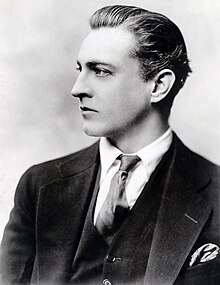
Back John Barrymore Afrikaans جون باريمور Arabic جون باريمور ARZ John Barrymore AST جان باریمور AZB Джон Баримор Bulgarian জন ব্যারিমোর Bengali/Bangla John Barrymore Catalan جۆن باریمۆر CKB John Barrymore Czech
John Barrymore | |
|---|---|
 Barrymore in 1918 | |
| Born | John Sidney Blyth February 14 or 15, 1882 Philadelphia, Pennsylvania, U.S. |
| Died | May 29, 1942 (aged 60) Los Angeles, California, U.S. |
| Resting place | Mount Vernon Cemetery, Philadelphia |
| Relatives | Barrymore family |
John Barrymore (born John Sidney Blyth; February 14 or 15, 1882 – May 29, 1942)[a] was an American actor on stage, screen, and radio. A member of the Drew and Barrymore theatrical families, he initially tried to avoid the stage, and briefly attempted a career as an artist, but appeared on stage together with his father Maurice in 1900, and then his sister Ethel the following year. He began his career in 1903 and first gained attention as a stage actor in light comedy, then high drama, culminating in productions of Justice (1916), Richard III (1920), and Hamlet (1922); his portrayal of Hamlet led to him being called the "greatest living American tragedian".[2]
After a success as Hamlet in London in 1925, Barrymore left the stage for 14 years and instead focused entirely on films. In the silent film era, he was well received in such pictures as Dr. Jekyll and Mr. Hyde (1920), Sherlock Holmes (1922) and The Sea Beast (1926). During this period, he gained his nickname, the Great Profile. His stage-trained voice proved an asset when sound films were introduced, and four of his works, Grand Hotel (1932), Dinner at Eight (1933), Twentieth Century (1934), and Midnight (1939), have been inducted into the National Film Registry.
Barrymore's personal life has been the subject of much attention before and since his death. He struggled with alcohol abuse from the age of 14, was married and divorced four times, and declared bankruptcy later in life. Much of his later work involved self-parody and the portrayal of drunken has-beens. His obituary in The Washington Post observed that "with the passing of the years – and as his private life became more public – he became, despite his genius in the theater, a tabloid character."[3] Although film historians have opined that Barrymore's "contribution to the art of cinematic acting began to fade" after the mid-1930s,[4] Barrymore's biographer, Martin Norden, considers him to be "perhaps the most influential and idolized actor of his day".[5]
- ^ Kobler 1977, p. 26; Peters 1990, p. 9.
- ^ Cite error: The named reference
BL: Hamletwas invoked but never defined (see the help page). - ^ Cite error: The named reference
WP: Obitwas invoked but never defined (see the help page). - ^ McCaffrey & Jacobs 1999, p. 32.
- ^ Norden 2000a, p. 178.
Cite error: There are <ref group=lower-alpha> tags or {{efn}} templates on this page, but the references will not show without a {{reflist|group=lower-alpha}} template or {{notelist}} template (see the help page).
© MMXXIII Rich X Search. We shall prevail. All rights reserved. Rich X Search